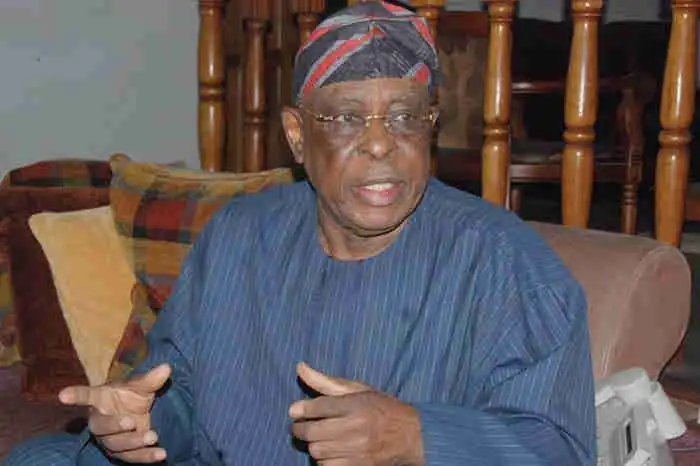
Olusegun Osoba
Former governor of Ogun State, Chief Olusegun Osoba, on Thursday in Lagos likened the risks in pursuing investigative journalism in Nigeria to fighting corruption.
He said both are very dangerous acts to pursue in the country.
Osoba made this known on the sidelines of a colloquium in honour of Kunle Ajibade’s 60th birthday.
The ex-governor, who was the chairman of the occasion, stressed the dangers of investigative journalism.
According to him, digging beyond the surface by journalists has led to a number fatalities in the country.
“Investigative journalism is as dangerous as fighting corruption in our country. They are both extremely dangerous,” said Osoba.
Osoba, during the colloquium, also called for ‘Open Ballot Electoral System’ in Nigeria, explaining that open ballot system produced him as governor against the preference of political godfathers of the day in Ogun State.
The event themed: ‘A Brighter Future for Nigeria And How To Get There’ attracted media mogul, civil society organizations, lawyers and other prominent Nigerians, including Gov. Rauf Aregbesola of Osun State.
Nobel laureate, Prof. Wole Soyinka; poet, Odia Ofeimun; Bisi Fayemi; Femi Falana (SAN); former president of Civil Liberties Organization, Ayo Obe; Amb. Tokunboh Awolowo-Dosunmu, were also at the event.
Kunle Ajibade’s professional colleagues, who went through turbulent periods under both Gen. Ibrahim Babangida and Sanni Abacha military regimes, including Sen. Babafemi Ojudu, Mike Awoyinfa, Owei Lakemfa, and others, were also on hand to lend support.
Presidential aspirant and publisher of Sahara Reporters, Omoyele Sowore, was also in attendance.
Soyinka, Falana and Ofeimun, at the event, also dwelled on the dangers of investigative journalism, which made Ajibade famous in Nigeria.
They praised the author of the books titled: ‘Jailed for Life’ and ‘What a Country’, for his doggedness and commitment.
“I owe Kunle inestimable debt for dragging him into the dangerous terrain of investigative journalism, which he discharged with deep investigative zeal,” Soyinka said.
He, however, lamented that the job is yet to be over as the question of who corrupted the institutions remains germane.
“It is not enough to trace various bank accounts of a former Inspector General of Police, but where does all the monies come from?
“He was not even operating most of these accounts.
“There is a nexus between this expose and how elections are rigged in the country. Who corrupted the IG? Why is it so difficult to pursue the original owners of the loot?” Soyinka queried.
Describing Ajibade as a pioneer of investigative journalism in Nigeria, Soyinka pointed out that the number of journalists killed in the pursuit of investigative journalism is more than those killed covering war.
On his part, Ofeimun recalled Ajibade’s journey through journalism and various face-offs with military dictatorship, which culminated in his being sentenced to life imprisonment for treason.
13 journalists were in various jails across Nigeria at a particular time under the administration of General Abacha.
Ajibade was released after Abacha died in office in June 1998.
He was released in July 1998 by Gen. Abdulsalami Abubakar, Abacha’s successor.
Others at the colloquium, including Prof. Kingsley Moghalu, Sam Omatseye, Ayisha Osori, Idowu Obasa and Lai Babatunde (SAN), also spoke in similar vein on investigative journalism.
Mrs Fayemi, who stated that she was not attending to represent her husband, the Minister of Solid Mineral, Dr. Kayode Fayemi, also recalled her foray into investigative journalism with ‘Radio Kudirat’, where she was a broadcaster under a pseudo-name, ‘Iyuade’.
She said: “Either for the good or for evil, we must remember that we would be remembered somehow.
“How do you want to be remembered?” she queried as her admonition for continuously do good in the society.